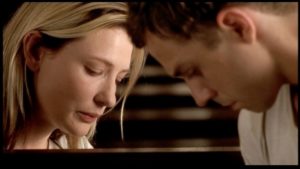Directed by Tom Tykwer. Written by Krzysztof Kieslowski and Krysztof Piesiewicz. Music by Arvo Pärt. Starring Cate Blanchett, Giovanni Ribisi, and Remo Girone. 97 mins. Rated R.
For all of their importance in living, there are very few confession sequences in films, at least good ones. The best known, perhaps, is implicit. George Bailey in Frank Capra’s It’s a Wonderful Life (1946) simply prays for another chance at living once shown all the good that happened because he has lived the life he has. And so he prays to simply be rid of his current self-pitying funk amid what seem insurmountable troubles that range from too many kids, a drafty house, and, to be sure, the bank examiner. The most cogent, and memorable, is Michael Corleone’s confession to a future pope (John Paul II). That is amply wrenching and remarkably necessary, and it does prove consequential, at least for a while.
A favorite is from the little-known jewel Heaven (2002), a film starring a completely luminous Cate Blanchett as English-born Turin school teacher Philippa Paccard. The remarkable Polish screen-writing duo, Krzysztof Kieslowski and Krzysztof Piesiewizc, co-wrote one of cinema’s greatest accomplishments, Dekalog (1988), directed by Kieslowski, a ten-part series on the Ten Commandments done for Polish television (it is available in a new edition from Criterion, the Rolls-Royce of DVD production). After the Iron Curtain fell in 1988 the pair undertook a trilogy, Three Colors, each film taking its inspiration from one of the colors of the French flag (and no, the films are not political, at least in terms of topicality). Heaven is also part of a trilogy, the other two being Hell (2005) and Purgatory (2007), all set in Italy. After Kieslowski’s untimely death in 1996, the Heaven screenplay went to notable German director Tom Tykwer (Run, Lola, Run).
And Heaven, as the title would suggest, is a redemption tale that clarifies what redemption is all about and for, just as the other films clarify what makes hell and purgatory such as they are (watch Hell, if you have the courage). In any case, without giving away crucial plot circumstances, Philippa is on the run, aided by smitten young policemen Filippo (American actor Giovanni Ribisi), and they end up in the hilltop town of Montepulciano, Philippa’s hometown, wherein they immediately enter the church on the town square. Her words begin in overlay even before they enter. “I’ve done a lot of damage, and stupid, stupid things” (1:08:20). Here Cate Blanchett’s bluntness and transparent sorrow in her recitation suggest that these are matters that deeply pain Philippa and to which she has given much thought. As her voice continues, the camera slowly approaches the chancel, glimpsing the confessional on the far side of the sanctuary, then cutting to view briefly the backs of the pair sitting side by side in a pew near the front.

In the next shot, however, now opposite Philippa, Filippo sits on the back of the pew in front of her, his head turned to one side and downward, mimicking the typical posture of the priest in the confessional with his ear to the screen.

With the notes of Arvo Pärt’s stunning Fur Alina playing slowly, with concise, deliberate enumeration, her face looking down and forward, Philippa recounts her evil, unloosing her soul, moving from lesser to greater: “I’ve lied to my mother and my sister, many, many times. I was unfaithful to my husband once, and I didn’t do everything I could to save him. Anyway, maybe it’s not possible to do everything. Four people died because of me, and I can’t live with that. I’ll never be able to” (1:08:35). As she talks, the violin of Arvo Pärt’s Fur Alina continues to eke out its notes and the camera slowly circles, just the couple, seemingly, the only source of light in the darkened church.
And then things get serious, in matters as profound as guilt, Philippa volunteers, now looking for the first time straight into Filippo’s face, that “what you don’t know is that I’ve ceased to believe” (1:09:25). “Ceased to believe in what?” he asks. “In sense, in justice, in life” is the reply, meaning belief in anything that might make life worth living, including God presumably. To all of this self-incrimination, Filippo responds, now for the first time looking straight into Philippa’s face, with words of absolution, words that not only absolve but contain the entirety of the only rationale for forgiveness, both Filippo’s and, presumably, God’s. With intensity but with little emotion, Filippo carefully pronounces “I love you,” a gift Philippa readily acknowledges with a simple “I know,” though she finds the timing of this love terrible for “It’s just, it’s just that I want the end to come soon” (1:10:15).
No matter, though, for Filippo leans forward, gently putting his arm around her to whisper in her ear, though we do not hear what he says. The words of absolution from the sacrament of confession seem a likely candidate, though he has in truth already pronounced them in his declaration of love.

In any case, in acknowledging the reality of Filippos’s enormous care, him risking all to free her, she at the least admits the possibility of outlandish love despite human failings, a notion that lies at dead center of the character of the Christian God. To that end, the scene perfectly distills the core of historic Christian theology: no matter the transgressions, mild or major, the reflexive action of God (God being who God is) is love so extreme that it reflexively cherishes and forgives. Suffice it to say that in this sequence all those visual and musical elements that Tykwer has evocatively sprinkled through the story coalesce to flourish full bloom. God IS love, exultant and whole. Incredibly, plain and simple and complete; no kidding.
Written by Roy Anker, author of the 2017 Eerdmans book, Beautiful Light: Religious Meaning in Film. Parts of this entry are drawn from this highly recommended new work.
Sign Up for Our Newsletter!
Insights on preaching and sermon ideas, straight to your inbox. Delivered Weekly!

Categorized into Confession, Forgiveness, Guilt
Heaven (2002)